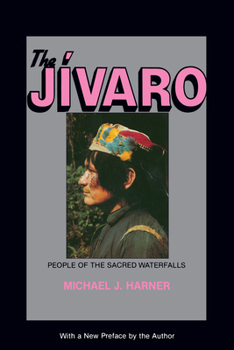The Jivaro: People of the Sacred Waterfalls
Select Format
Select Condition 
Book Overview
Only one tribe of American Indians is known ever to have successfully revolted against the empire of Spain and to have thwarted all subsequent attempts by the Spaniards to reconquer them: the Jivaro (hee'-va-ro), the untsuri suarii of eastern Ecuador. From 1599 onward they remained unconquered in their forest fastness east of the Andes, despite the fact that they were known to occupy one of the richest placer gold deposit regions in all of South America. Tales of their fierceness became part of the folklore of Latin America, and their warlike reputation spread in the late nineteenth and early twentieth centuries when Jivaro "shrunken head" trophies, tsantsa, found their way to the markets of exotica in the Western world. As occasional travelers visited them in the first decades of this century, the Jivaro also became known not as just a warlike group, but as an individualistic people intensely jealous of their freedom and unwilling to be subservient to authority, even among themselves. It was this quality that particularly attracted me when I went to study their way of life in 1956-57 and I was most fortunate, at that time, to find, especially east of the Cordillera de Cutucli, a portion of the Jivaro still unconquered and still living, with some changes, their traditional life style. This book is about their culture.
Format:Paperback
Language:English
ISBN:0520050657
ISBN13:9780520050655
Release Date:September 1984
Publisher:University of California Press
Length:239 Pages
Weight:0.73 lbs.
Dimensions:0.6" x 5.2" x 8.1"
Customer Reviews
2 ratings
A "sexy" classic..
Published by Thriftbooks.com User , 21 years ago
Harner's Jivaro is a very interesting book. I cannot attest to the ethnographic veracity of the text as some other reviewers, but I can speak to what I thought about the book. This book is one of the most fascinating ethnographies I have read. It is very "sexy": violence, drugs, death, decapitation, shrunken heads...edgy stuff. What utterly fascinated me was the description of how this state of affairs came about. Harner claims that head-hunting raids didn't take place, or at least not with the frequency as reported in this book until the introduction of firearms by the Spanish. At this point rival tibes were better able to kill each other, and violence increased. I found it all very interesting, and would recommend it.
classic ethnography
Published by Thriftbooks.com User , 22 years ago
This is a classic ethnography of the Shuar, the one that established the standard for all subsequent descriptions of the Shuar. I have done extensive field work with a Shuar related group and was impressed on how accurate Harner's account was, even though the group I worked with was separate in both time and space from the untsuri shuar. This is a must read for anyone interested in the ethnography of lowland South America.






